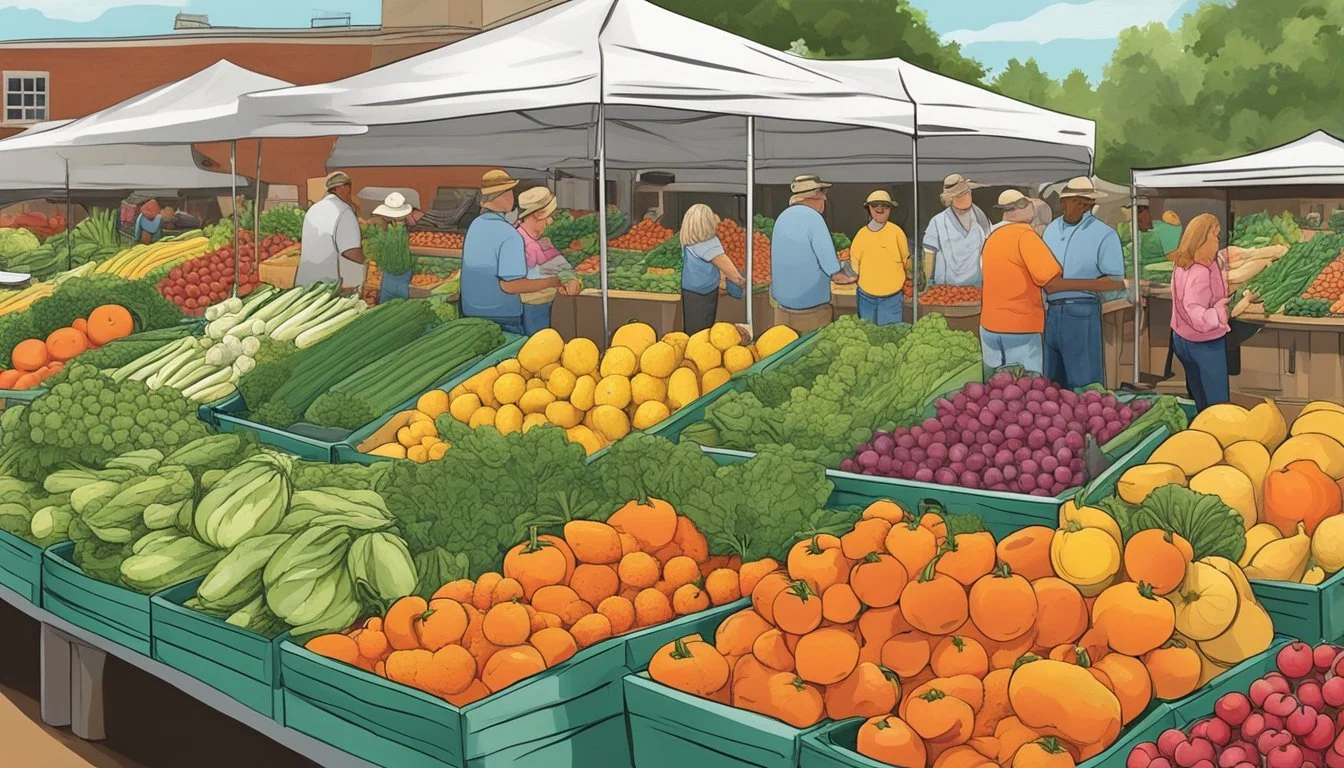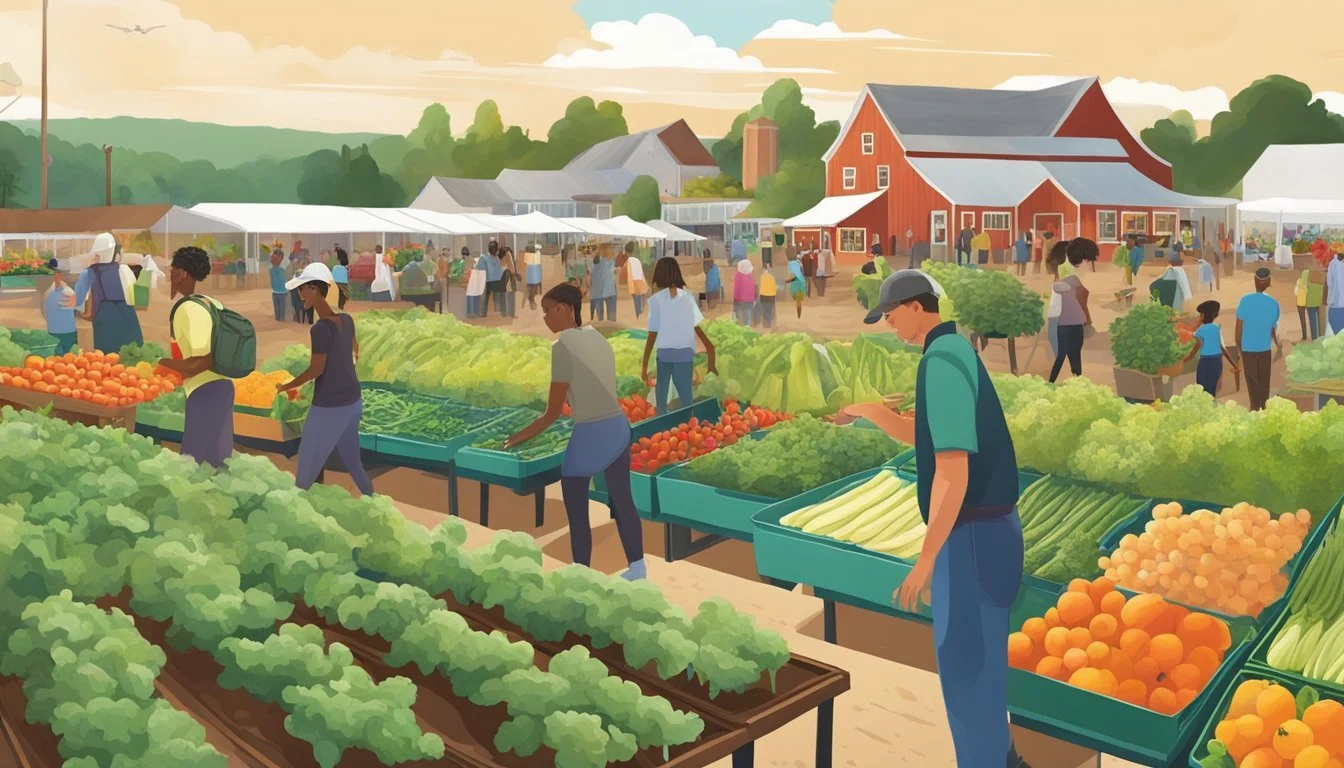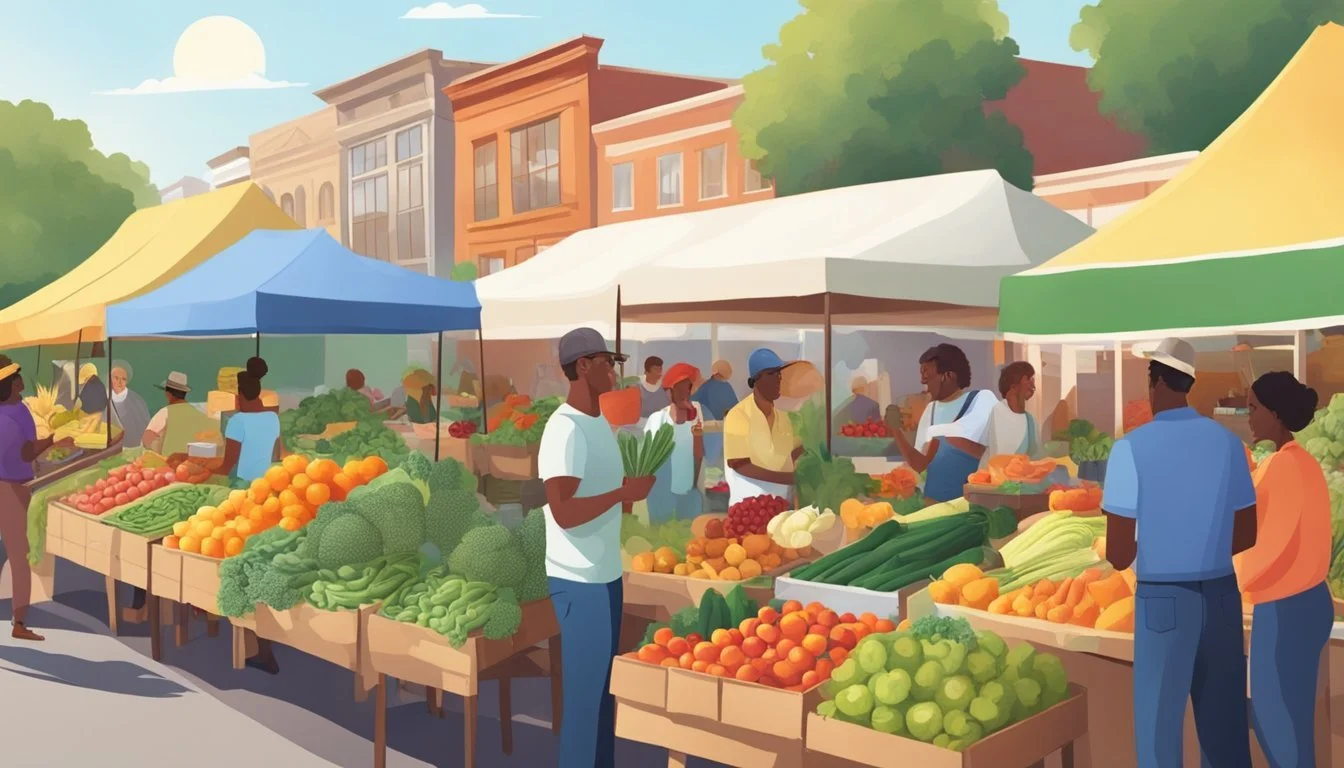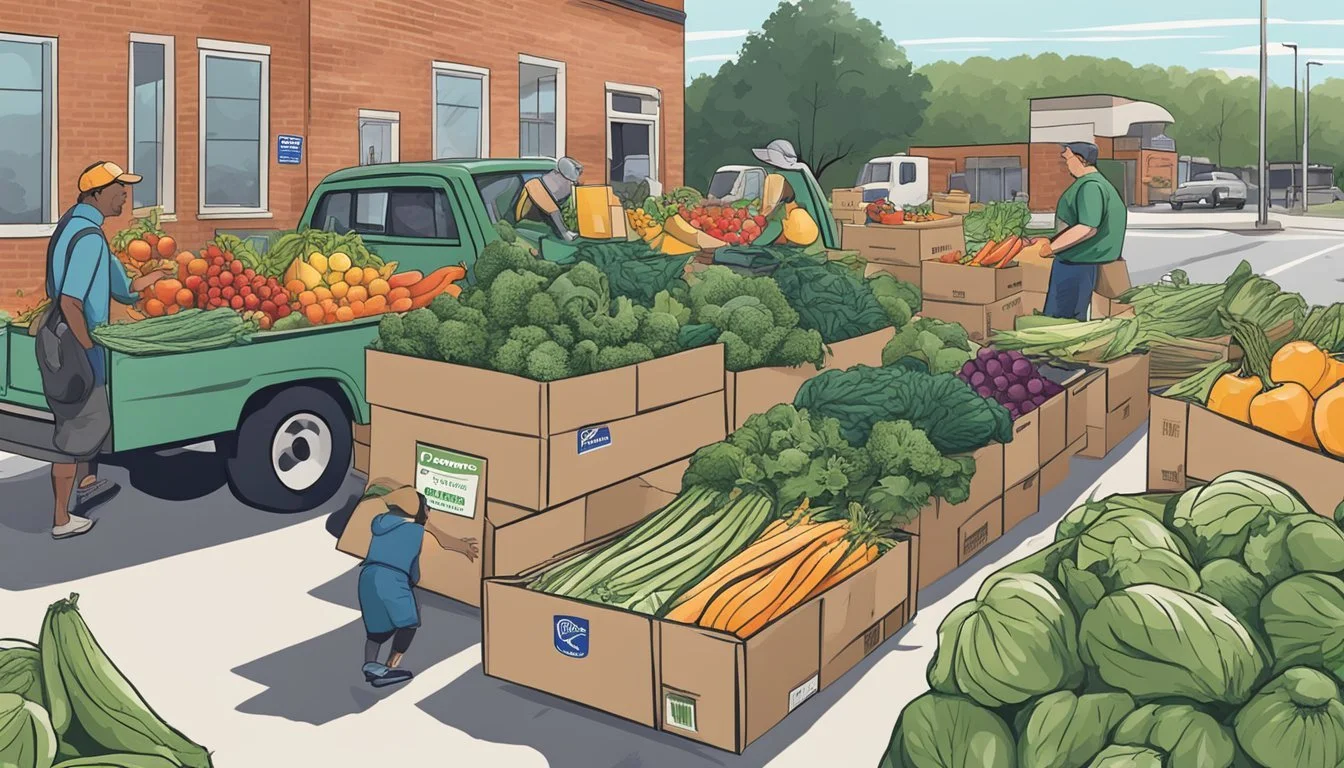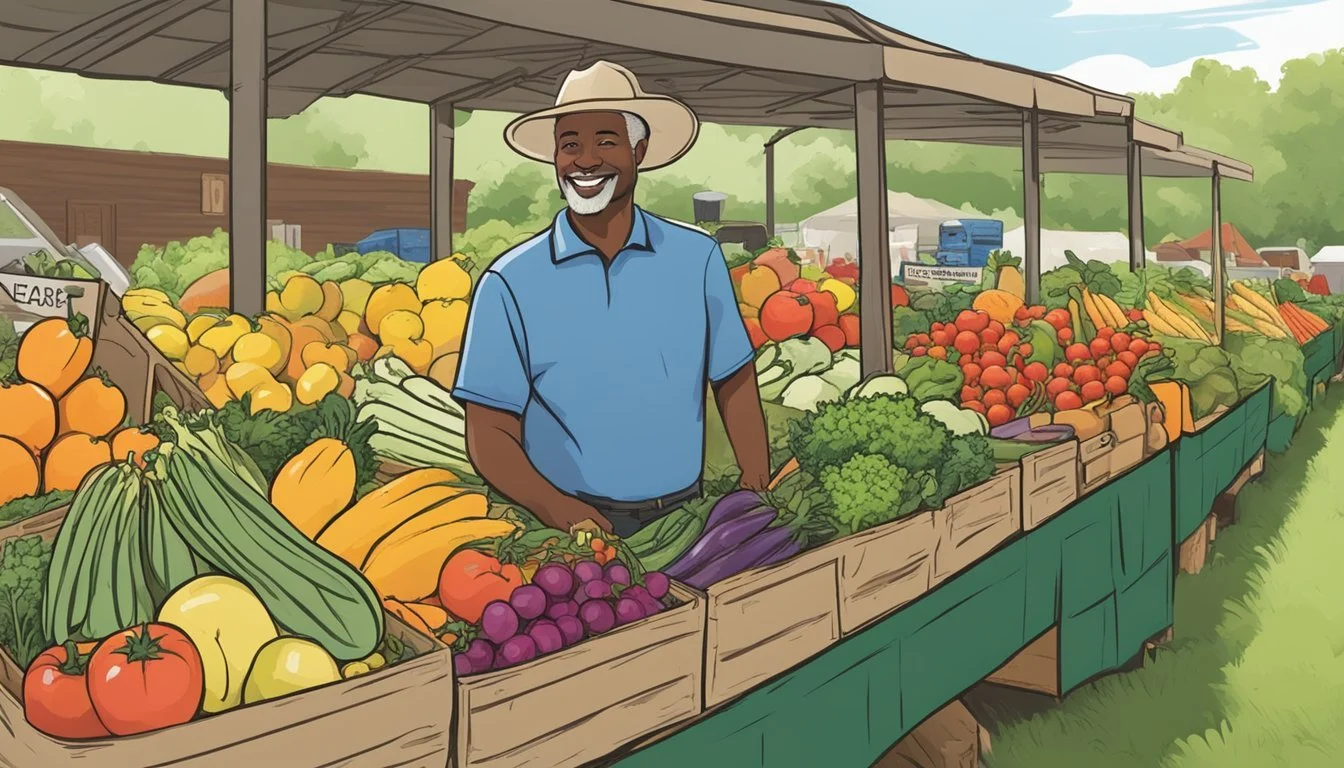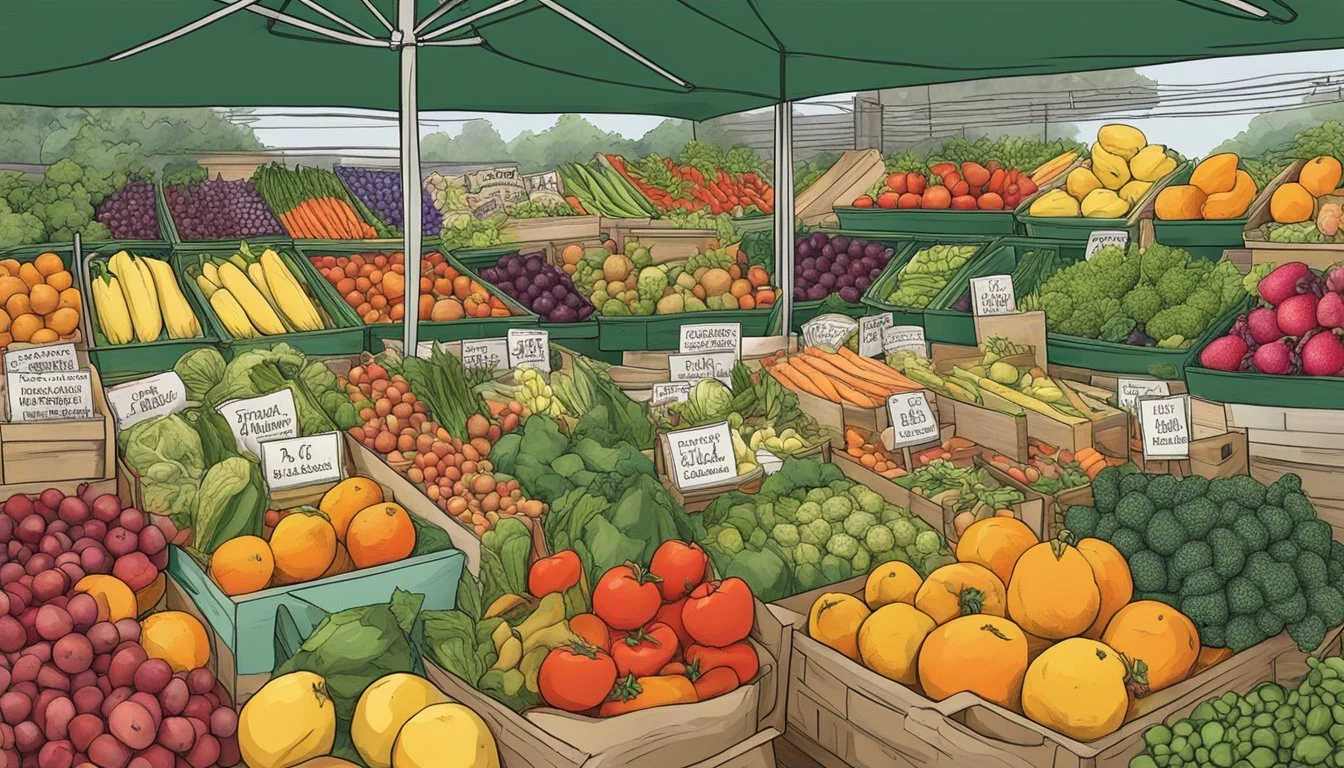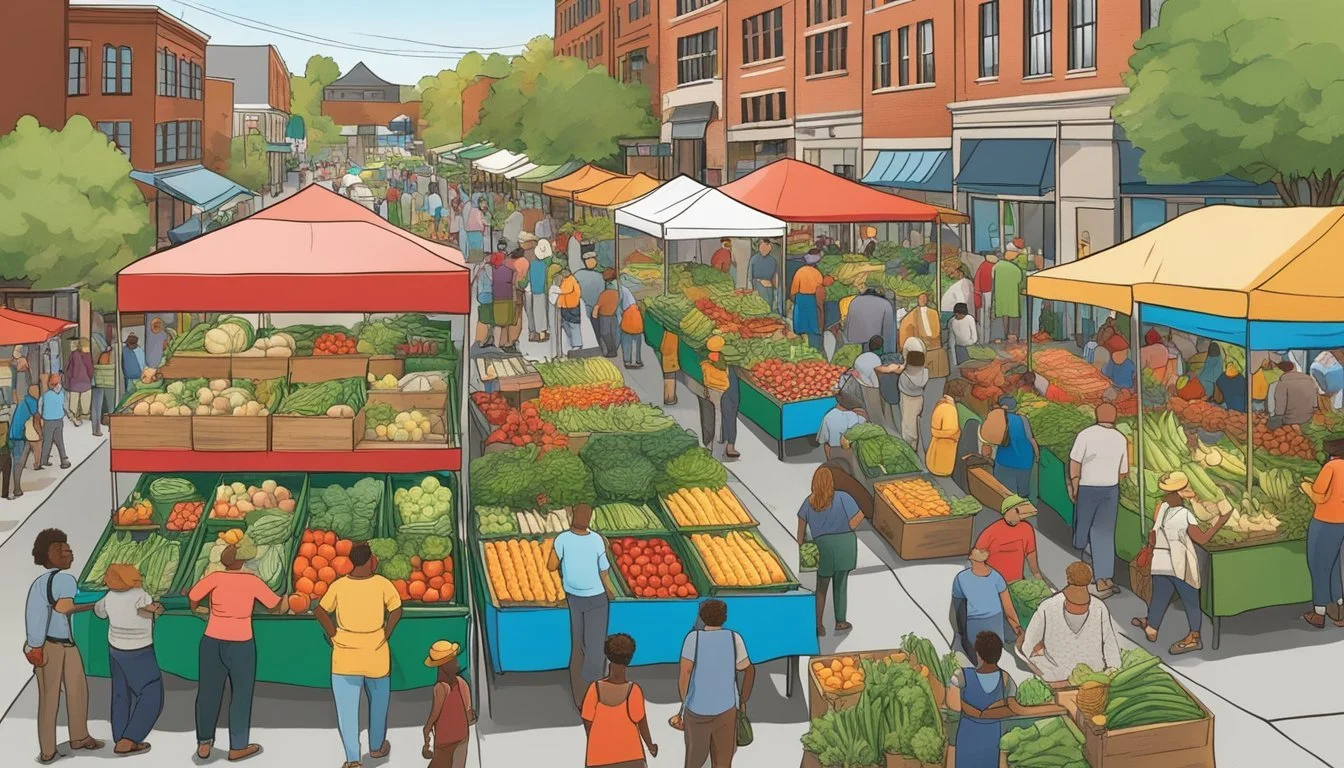Community Supported Agriculture (CSA) in Winston-Salem, NC
A Guide to Local Farm Partnerships
Community Supported Agriculture, commonly known as CSA, is a form of agriculture where producers and consumers share the risks and benefits of farming. In Winston-Salem, North Carolina, CSA programs connect local farmers directly with consumers. Participants, often referred to as shareholders, subscribe to the harvest of a particular farm or group of farms. In return, they regularly receive a portion of fresh produce, such as fruits and vegetables, and sometimes additional farm products like eggs, meats, and cheeses.
This model of farming and buying food serves to foster a partnership between local residents and farmers where mutual support is emphasized. Consumers in Winston-Salem have the opportunity to enjoy fresh, locally-produced food while contributing to the sustainability and success of their local farming community. CSA members typically receive their shares weekly or monthly and are often encouraged to engage with the farming process through farm visits or volunteer opportunities, thereby deepening their understanding of the local agriculture.
What is Community Supported Agriculture (CSA)?
Community Supported Agriculture (CSA) offers a mutually beneficial partnership between local farmers and community members through membership-based produce procurement.
The CSA Model Explained
The CSA model is a system in which individuals pledge support to a farm or group of farms, thus establishing a network of mutual aid and shared responsibility. These arrangements typically entail consumers purchasing a "share" of the farm's output in advance, fostering a financial backbone that supports farming operations.
Advance Payment: Consumers pay for their CSA membership at the beginning of the growing season.
Shared Risk and Reward: Both consumers and producers share the risks of farming, including poor harvests due to unfavorable weather or pests.
Benefits of CSA for Consumers and Farmers
For consumers: CSAs provide access to fresh, local food, and the opportunity to directly engage with the source of their produce. This transparent supply chain affords a greater appreciation for farm-to-table eating.
Benefits for Farmers: Gain upfront capital, secure a dedicated customer base, and reduce waste by growing with a clear market in place.
Benefits for Consumers: Obtain nutritious, often organic produce, and forge a deeper connection with the local farming community.
Different Types of CSA Programs
CSA programs vary, ranging from traditional produce shares to more customized approaches that may cater to specific consumer preferences.
Traditional Share: Members receive a weekly or bi-weekly assortment of produce determined by the farm's current harvest.
Market-Style: Allows members some choice in selecting the produce within their share from a more market-like setting.
Each type of CSA facilitates a distinct interaction with local food systems, but all maintain the core philosophy of community-supported agriculture.
The Growth of CSA in Winston-Salem
Community Supported Agriculture (CSA) has become a vital part of Winston-Salem's local food landscape, thriving through robust community engagement and commitment to sustainable farming practices.
Historical Development
The concept of CSA took root in Winston-Salem with the establishment of small family farms looking to strengthen their bond with local consumers. Historical data reflects that farms like Plum Granny Farm have been integral in providing residents with fresh farm products for over 150 years. These farms tapped into the CSA model as a means to ensure crop sales by inviting customers to subscribe for regular deliveries of farm goods.
Current Statistics and Data
As of the latest recordings, CSA participation in Winston-Salem has seen a notable increase. Data collected from local farms and agricultural extensions showcase a rise in CSA subscriptions. Farms report that typical shares range from $400-$700 annually, with these memberships helping to stabilize farm income and allowing consumers to partake in the local harvest regularly.
Factors Influencing Growth
Several factors have driven the growth of CSAs in Winston-Salem:
Consumer Awareness: A better-informed public committed to sustainable living has amplified interest in CSAs.
Direct Relationships: Customers value building personal relationships with their farmers, and CSA facilitates this connection.
Quality and Freshness: There is a prevailing preference for the superior taste and nutrition of locally-grown, fresh farm products.
Educational Outreach: Efforts from local agricultural experts, such as Extension Agent Horticulture for Small Farms and Local Food, have successfully promoted the benefits of CSAs through active education and engagement initiatives.
Each of these factors contributes to the thriving community supported agriculture movement within the city, reflecting a paradigm shift towards sustainable consumer practices in Winston-Salem.
Local CSA Farms in Winston-Salem
Winston-Salem, North Carolina, is home to a number of Community Supported Agriculture (CSA) farms where local farmers offer a range of products including fruits, vegetables, meats, and eggs directly to the community. Members who subscribe can enjoy fresh, locally sourced produce while supporting the sustainability and success of these local farms.
List of Farms
Plum Granny Farm: Located in King, NC, this small farm emphasizes ecologically sound practices and heritage as a NC Century Farm.
Anders Family Farm: Based in Tobaccoville, NC, they are known for providing a variety of farm products to the local community.
Greenbrook Farm: Offering a CSA filled with diverse produce like beans, corn, and organic fruits and vegetables in Forsyth County.
Spotlight on PTB Farm
PTB Farm stands out for its commitment to sustainable farming practices and offering a wealth of options for its CSA members. The farm's CSA typically includes a diverse assortment of vegetables and the option for members to add on pasture-raised eggs and ethically sourced meats, ensuring a comprehensive local food experience.
Spotlight on Mill River Farm
Mill River Farm is renowned for its dedication to organic farming. They provide an array of seasonal vegetables and often integrate fruits into their CSA shares. Their practices ensure that the local community gains access to healthy and organically grown produce.
Spotlight on Faucette Farms
Faucette Farms is driven by a focus on environmentally friendly agricultural practices. It offers CSA memberships that feature a wide selection of its harvest, such as fresh vegetables and fruits. Their approach ensures that consumers benefit from nutritious and sustainably farmed produce.
The CSA model in Winston-Salem fosters a close-knit relationship between consumers and their food sources, promoting health, sustainability, and community resilience.
How CSA Benefits Winston-Salem
Community Supported Agriculture (CSA) in Winston-Salem directly nurtures the city’s fabric through the fortification of its local economy, the promotion of sustainable agricultural practices, and the fostering of robust community connections.
Supporting Local Economy
By subscribing to CSAs, residents of Winston-Salem infuse capital directly into local farms, circumventing the need for intermediaries. Local farmers receive upfront financial support which can be used for essential farm operations, securing crop yields for the season. This model resonates well within the city’s economy, as it empowers local spending and retains wealth within the community.
Promoting Sustainable Agriculture
Winston-Salem's CSA programs champion sustainable agricultural methods by supporting farms that often employ organic practices and careful stewardship of the land. These practices reduce the carbon footprint associated with long-distance transportation of food products, aligning with USDA guidelines for sustainability. The regional focus of CSAs on local produce further encourages crop diversification, which is essential for soil health and ecosystem stability in NC.
Building Community Connections
CSAs forge strong relationships between Winston-Salem residents and farmers. By participating in CSA programs, individuals gain insight into the provenance of their food and often receive opportunities to visit farms and engage in community events. This setup not only brings transparency to the food production process but also enriches the city’s social fabric, linking the urban community with the rhythms of agricultural life. Moreover, CSA pick-up points often coincide with farmers markets, fostering a sense of camaraderie and interconnectedness as community members come together to collect their shares of the harvest.
Joining a CSA in Winston-Salem
Winston-Salem residents looking to join a Community Supported Agriculture program have several options that offer fresh, local produce. Here's how to get involved.
How to Choose the Right CSA
Location and Type: Proximity to pick-up sites is crucial when selecting a CSA. In Winston-Salem, prospective members can choose among various types of CSAs, such as producer-initiated, member-initiated, multiple-producer, or organization-initiated CSAs.
Farm Practices and Offerings: Research the farming practices of each CSA to ensure they align with personal preferences. Some offer organic produce, while others might provide a broader range including fruits, vegetables, eggs, and meats.
Understanding Share Sizes and Costs
Share Types: Most CSAs offer full shares and half shares, catering to different household sizes and consumption needs. Full shares generally suit families or sharing among multiple households, while half shares are ideal for individuals or small families.
Share Type Typical Contents Est. Price Range Full Shares Suitable for 3-4 people $400 - $700 per season Half Shares Suitable for 1-2 people $200 - $350 per season
Payment Plans: Many CSAs offer payment in installments, reducing the upfront cost and making it more accessible.
The Membership Process
Signing Up: Membership usually begins by contacting the CSA directly. For example, members can reach out to the contact provided by the CSA, such as a lead farmer or an organizing entity.
Commitment: By joining a CSA, members commit to supporting their chosen farm for a season, receiving regular distributions of farm produce in return. This fosters a robust local food system and community engagement with local agriculture.
Member Experiences with CSA
Joining a Community Supported Agriculture program in Winston-Salem offers a unique opportunity to engage with the farming process and enjoy the bounty of locally grown produce. Members share their experiences, and through newsletters and weekly shares, they stay informed and connected to the farm's offerings.
Testimonials and Member Stories
Members of Winston-Salem CSAs often report a deepened appreciation for the local food community. They share stories of visiting the farms and forming personal connections with the farmers. These narratives are commonly featured in newsletters, encouraging more people to participate. Regular testimonials highlight the joy of receiving a variety of fresh produce, including fresh flowers and specialty items, which may not be found in traditional grocery stores.
Weekly Shares and What to Expect
Upon subscribing to a CSA, members typically receive weekly boxes filled with an array of farm products. Contents of these shares vary depending on seasonal availability, but consistently include fresh vegetables and fruits. Traditionally, the contents are a surprise, which introduces members to new produce and encourages culinary exploration. Here's a brief table of what members might expect:
Season Potential Weekly Share Contents Spring Lettuce, spinach, radishes, herbs Summer Tomatoes, cucumbers, peppers, peaches Fall Squash, apples, kale, pumpkins
In addition to produce, some CSAs offer recipes to help members use their weekly items in nutritious and delicious ways.
The Role of Member Feedback
Feedback is a critical component of CSAs, as it shapes future farming and business decisions. Members are often encouraged to provide their insights, which can lead to the inclusion of more preferred items in future shares or the adjustment of share quantities. Farms utilize this feedback to improve, ensuring customer satisfaction and community engagement.
Through these various touchpoints, members become an integral part of the CSA's success and sustainability.
CSA Management and Best Practices
Effective Community Supported Agriculture (CSA) management involves meticulous planning and agile financial control. CSA operators in Winston-Salem, NC, must focus on creating comprehensive business plans, ensuring sound budget management, recruiting and retaining members proficiently, and adaptively responding to market fluctuations and challenges.
Creating a Business Plan for CSA
A business plan is critical for CSA success. It outlines the farm's core objectives, strategies, and the operational structure. The plan should detail the types of products offered, prospective customer base, and marketing strategies. Farmers must also include a risk assessment to prepare for variable crop yields or market demand changes.
Budgeting and Financial Management
CSA requires rigorous budgeting and financial oversight. Farmers should track all expenses and revenues meticulously, generating regular reports to assess the financial health of their CSA. This includes costs of seeds, equipment, labor, and distribution, balanced against revenue from member subscriptions. Initial capital and annual operating costs should be clearly projected in the business plan.
Strategies to Recruit and Retain Members
Successful CSA models rely on a strong membership base. Recruiting members calls for effective communication of the CSA's benefits, such as freshness, variety, and local production. To retain members, farmers should maintain high-quality produce, offer diverse products, and foster community engagement through farm events or newsletters.
Adapting to Market Changes and Challenges
CSAs must be adaptive to thrive amidst market shifts and challenges. When consumer preferences evolve or new competitors emerge, CSA operators should be ready to pivot, potentially altering their product offerings or adjusting marketing tactics. Building a flexible business model can help buffer against unforeseen events, such as extreme weather or economic downturns.
Educational Resources and CSA Networking
Educational resources and networking opportunities are critical for the growth and sustainability of Community Supported Agriculture (CSA) in Winston-Salem. These platforms provide essential information for both new and established CSAs, ensuring they thrive through shared knowledge, innovation, and community engagement.
CSA Innovation Network and Resources
Winston-Salem's CSA community can access a wide array of resources through the CSA Innovation Network. This network serves as a hub for creative solutions and best practices for CSA management, distribution, and product offerings. It also provides insights into how regional farms can maintain a symbiotic relationship with the public, which is foundational to the CSA model.
Workshops, Seminars, and Events
Educational workshops and seminars are regularly organized by agricultural experts and extension agents, offering tailored information catered to small farms in the north central Piedmont area and beyond. These events cover:
Farm Product Diversity: Optimization of farm products, including fruits, vegetables, meats, cheeses, and more.
CSA Distribution Models: Effective strategies for distributing CSA shares to members, ensuring freshness and convenience.
Participation in these events helps farmers to stay abreast of industry trends and evolving customer preferences, which is crucial for the continuity of CSA operations in the area.
Networking Opportunities for Farmers and Members
Networking within the CSA framework allows for a connection between farmers and their members, fostering community involvement and a transparent food system. Opportunities to network include:
Local farm visits
CSA fairs and meetups
Online forums and social media groups
Through these avenues, farmers can engage directly with their members, discuss the local food system's needs, and build long-lasting relationships that support the success of CSAs in the Winston-Salem region.
Additional Products Offered by CSAs
Community Supported Agriculture (CSAs) in Winston-Salem extend beyond the common offerings of fruits and vegetables. Many CSAs provide a diversity of products that cater to the preferences of their subscribers.
Cheese, Jams, and Specialty Foods
Subscribers to CSAs are often treated to a selection of artisan cheeses and handcrafted jams. Specialty foods are a cornerstone of many CSA boxes, including unique flavors of jellies made from local fruits.
Cheeses: A variety of cheeses, from classic cheddars to unique blends.
Jams/Jellies: Seasonal fruit-based spreads often include regional favorites.
Pasture-Raised Meat Options
CSAs provide meat from animals that are raised in pastures, not confined to feedlots. This practice supports animal welfare and offers nutritional benefits.
Pastured Chicken: Known for its superior taste and texture.
Pastured Pork: Often heralded for its juiciness and flavor.
Herbs and Season-Extending Products
Herbs are a significant add-on in CSA shares. Additionally, some CSAs implement techniques to extend the availability of products like corn and tomatoes well into the off-season.
Herbs: Fresh, aromatic herbs used for culinary and medicinal purposes.
Season-Extending Products: Includes greenhouse-grown tomatoes and late-harvested corn.
By including these products, CSAs offer a comprehensive local food experience, promoting the economy and sustainability of Winston-Salem's agricultural community.
Calendar of Agricultural Events
Winston-Salem's agricultural events provide a year-round opportunity for community engagement and support of local farmers. These occasions offer fresh produce, planting insights, and festive gatherings celebrating the city's rich farming heritage.
Annual CSA Fairs and Markets
Farmers Markets: Every Saturday, Winston-Salem hosts vibrant farmers markets, where local CSA programs showcase their offerings. These markets not only serve as a platform for purchasing farm shares but also for connecting consumers with the farmers who grow their food.
Spring Sign-Up Fair: March marks the beginning of CSA subscription season, with sign-up fairs held in various locations to enroll residents for the upcoming harvest cycles.
Fall Harvest Market: In October, farmers present the bounty of the season's harvest, offering a glimpse into the results of community-supported agriculture.
Seasonal Planting and Harvesting Guide
Planting Guide:
Spring: Farmers begin planting cool-season crops such as leafy greens and root vegetables, which are typically ready for early CSA boxes.
Summer: Transitioning to warm-season crops, an abundance of tomatoes, peppers, and summer squash fills the market stalls.
Harvesting Guide:
Spring to Early Summer: Harvesting commences with greens, herbs, and strawberries.
Late Summer to Fall: Stoned fruits and a variety of melons become available, near the peak of the harvest season in September.
Food Festivals and Community Gatherings
Community Gatherings:
The Crossnore CSA Program hosts weekly pickup events on Wednesdays, fostering regular interaction between community members, farmers, and the produce they receive.
Food Festivals:
Seasonal food festivals punctuate the calendar, with each celebrating the unique flavors and culinary traditions stemming from the region's agriculture. These festivals often feature cooking demonstrations, local artisan food products, and live music, exemplifying the harvest and community spirit of Winston-Salem.

